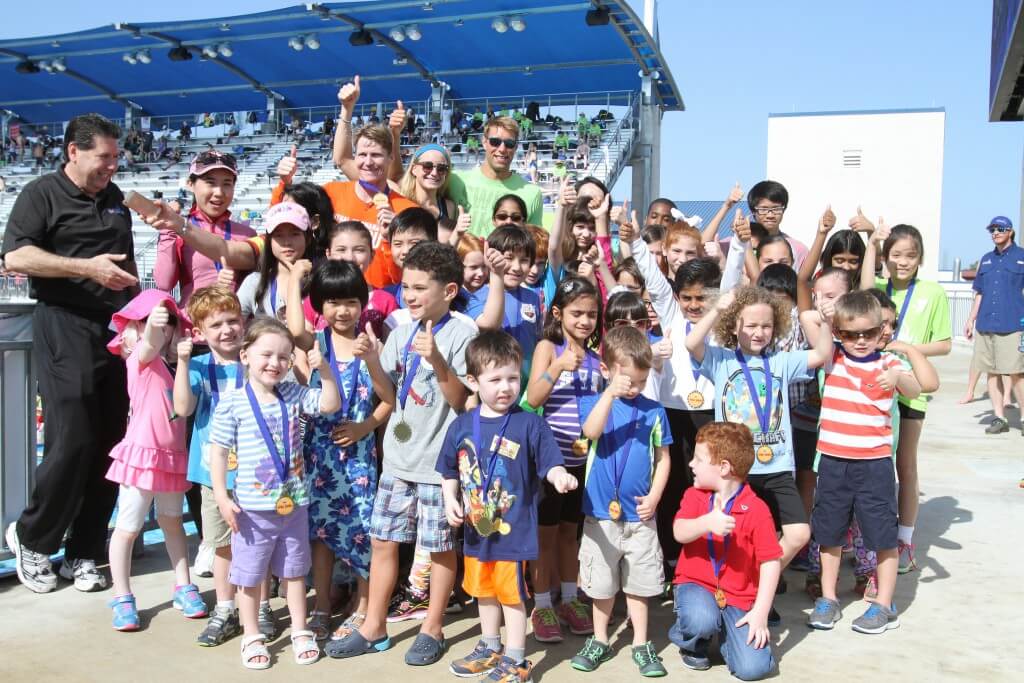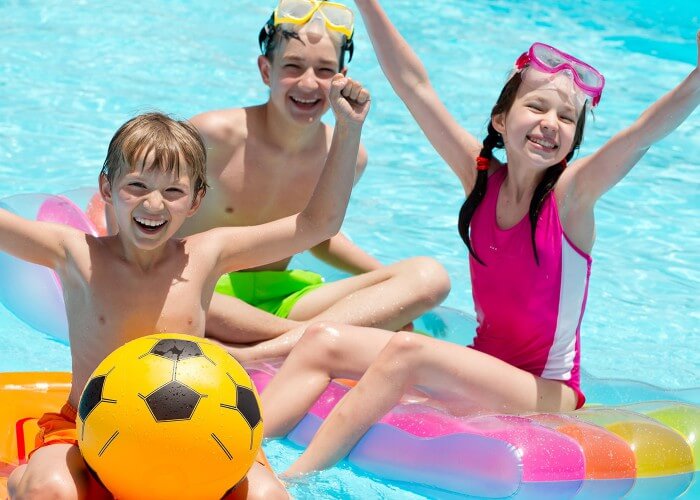Champion Child Syndrome, And How to Overcome It

By Wayne Goldsmith
Champion Child Syndrome: it’s a familiar pattern in swimming all over the world – and believe it or not all sports – football, baseball, basketball, hockey, athletics – all experience the same problem.
C.C.S. – Champion Child Syndrome – the swimmers who are “super-stars” at age 6, 7, 8, 9, 10 years of age – the swimmer’s who everyone – their parents, their coaches, their Club and even they themselves believe are destined for Olympic Glory are commonplace all over the swimming world.
And the sad thing is – that for the vast majority of these kids – these kids who people believe are capable of “anything” – end up achieving nothing in the sport.
For the most part the Champion Child (and to be frank there is no such thing as a champion child) – the best they’ll achieve in the sport is the ribbons and medals they get from their local school meets or state age meets before they hit the ripe old age of 13.
However, there are ways to overcome C.C.S. and to help all these talented young athletes realise their full potential and achieve their swimming dreams.
If you’re the parent or coach of a talented young swimmer, this article – could change your life – and more importantly – the life of your child.
Some of you might already be thinking “this author doesn’t know swimming in our state or country” and “my child super-star 8-year-old is different”.
Trust me. I do – and they aren’t.
Champion Child Syndrome – What it looks like:
C.C.S. is acted out all over the world – see if this looks familiar.
- Young child takes up swimming at age 6, 7 or 8.
- They show considerable talent at an early age – often winning races by large margins.
- Coaches – often at the parent’s insistence – accelerate the champion child’s passage through the squad program to do higher training loads.
- Child continues to improve and by 9 or 10 is winning school events – maybe state or national age championship level.
- Child goes through a growth spurt and finds it much more difficult to control their physicality and their strength, flexibility, power and speed through the water all change.
- Child stops winning or is no longer winning as easily.
- Parents move the child to another coaching program – believing the reason the child is no longer winning is that the coach is failing somehow.
- Child improves a little under the new coach but then soon returns to their poor form.
- Child tries longer distance events, intense gym programs or other alternatives to try to re-claim lost ability.
- Child retires from the sport by mid-teens.
Many of you are reading this and thinking about someone you know – or have known – and are probably stunned to find out that Champion Child Syndrome is such a wide-spread problem.
The purpose of this post – is to help those of you who are parents or coaches of kids who are in this cycle – and help you to help them to break free of it before it’s too late.
Reality Check – what do you really need to know, understand and accept about Champion Child Syndrome.
It all comes down to understanding what it is the sport of swimming is really about: here are five important “reality-checks” about the Champion Child.
Champion Child Reality check 1: Stop worshiping physical talent.
Over and over we see young superstars winning the State Under 9 50m backstroke or the school under 10 50m butterfly and have to listen to parents, coaches and others drone on and on and on about how talented the kid is and how they’re destined for swimming greatness.
Get over it!
Physical attributes like size, speed, strength and power are vastly over-rated with pre-pubertal kids and they are very poor indicators of long-term athletic potential.
Long term success depends on the systematic development of mental, emotional, technical, tactical, self-management and physical attributes.
Identifying Physical talent in the Champion Child is harder to hide than it is to find – saying “this kid’s talented” or “that kid’s fast” at a young age does not require any particularly knowledge or skill on the part of a coach or parent.
But what does require skill and considerable patience is to take time to develop the child’s character, values, virtues and human qualities – almost ignoring how big and strong they are aged 10 and under.
Champion Child Reality check 2: There’s no such thing as a champion 8-year-old anything.
Change your thinking. Your child is not a champion. They are a young human being who – for a number of reasons – happens to swim faster than other young human beings at this point in their respective development.
This year’s backstroker can be next year’s freestyler. A change in arm length or leg size or body proportionality will see kids who are seemingly invincible in one stroke this year – almost incapable of swimming the same stroke next year.
Champion Child Reality check 3: Who your child is, is not defined by what they do – who they are defines what they do.
At all costs avoid thinking about or talking about young swimmers as “John the backstroker” or “Katie the breaststroker”.
If your young super-star “backstroker” changes in size or shape from one season to the next and can no longer swim backstroke well – and you’ve defined them as the “backstroker” then they will lose confidence in everything they thought they could do well.
The young swimmer identifies as being a “backstroker”, and not a “breaststroker”, so when their breaststroke starts going better than their backstroke, they may not give themselves the chance to swim well in breaststroke – (same applies to the other strokes of course).
Sometimes the child will generalise their abilities and when they find they are no longer swimming as fast as they used to, or much faster than their competition, they decide they are no good at ANY-thing. The negative thought process of this can be considerably emotionally damaging.
It is critically important to understand this – and accept the potential problems this thinking can cause.
Champion Child Reality Check 4: For young swimmers – doing more swim training is not the answer.
Swimming fast as a senior swimmer demands the development of the ability to maintain technical excellence at high-speed, when fatigued and while experiencing the physical and emotional pressures of competition.
It is not about being the fittest. Or the strongest. And it’s certainly not about being the tallest.
It’s a combination of physical, mental, technical and tactical abilities that require a systematic approach to long-term development.
If all that mattered was being physically fit – sure – push your kids up and down the pool for hours and hours every day and they’ll go fast. Some of them will go very fast.
But they’ll also most likely be out of the sport completely by their mid-teens.
Champion Child Reality Check 5: They are a champion at one thing and therefore should be a champion in everything.
Lots of parents believe that their child should be the best in EVERY-thing they do.
No one is the best in everything they do.
Bill Gates might be a genius with a laptop – but he can’t break 48 seconds for a 100 freestyle. Mozart could write a pretty good piece of music but I doubt he would have broken 50 seconds for 100 fly.
It’s the nature of success – you become great at one thing – usually at the thing you love doing the most and by working hard at mastering it.
Allow young kids the opportunity to discover and learn to love something – let them “fall in love” with swimming or music or art or maths or football or life itself. Just don’t expect them to be the best all the time and in all things.
And allow them to be kids.
Children need relaxation time and free play time to actually develop and allow their brain to consolidate their learning and abilities.
They need time to connect with others (peers) and develop their own network of friends and support, i.e. that is not their parents or coaches. If they are swimming 10 hours a week, going to school 30 hours per week, practicing their instruments, attending another sport and completing their homework – when are they able to create their lifelong supporter and friends?
And the solution…it’s right in front of you.
The successful long-term development of a swimmer requires the combined effort of three “partners” – Coaches, Athletes and Parents – and on each of those partners doing their “job” to the best of their ability. (See) – video of lecture recently delivered by the author covering this topic in detail).
Coaches: your “job” is to provide leadership – technical leadership, tactical and strategic leadership, improve racing skills, provide an environment for athletes to learn all they need to learn about the sport, physical development and overall program planning and delivery.
Athletes: your “job” is to do everything you do to the best of your ability. Even on those days when your best is not your best (i.e. when you’re tired, flat, fatigued etc) – you give the best you can in all that you do.
Parents: your “job” is to develop the person – the human being who is capable of so many wonderful things. Your job is far more important than you realise. You help your child develop character. You teach them values and virtues like courage, commitment, dedication, honesty, integrity, humility, discipline and self-belief. You help them with practical things like time-management, nutrition and transport. And – as they get older – you step back – and help them to develop a sense of independence and responsibility.
When coaches, athletes and parents work together as a team – with a long-term view to developing the human being – then anything is possible.
Conversely, when the expectations of one or more of the “partners” are focused on developing a Champion Child, the potential for failure is high and the potential impact on the child’s long-term athletic success and more importantly – emotional well-being can be catastrophic.
Wayne Goldsmith
Come and Meet the Author: Wayne will be at this year’s ASCA World Clinic in Cleveland, OHIO.
He will be delivering a keynote presentation on the Soft Skills of Swimming on Friday September 11th 2015, 11:00 am – 12:00 pm: Soft Skills and Coaching Swimming: Turning Swimmers into Complete Athletes – (motivation, self-confidence, mental-toughness, commitment and other topics).
Later on the same day, 1:00 pm – 2:00 pm he is presenting a session called The Business of Swimming: Your Top 10 Questions Answered.
Wayne will also be presenting a special seminar on Friday September 11th: 2:30 pm – 5:30 pm Special Seminar with Coach Wayne Goldsmith, Australia. This seminar is strictly Limited to FIRST 30 Registrants!






Thank You!…
Excellent Article! Thank you! I have been one of those parents, and have since then stepped back. I may have not verbalized it out loud, but I did think and dreamed of having an olympian swimmer. I see so many swim parents caught up in their champion child and I worry what that is doing to their young athlete. I cringe when people comment about my child’s swimming or other “fast” 10&U swimmers and say things like, “We’ll be looking for her/him at the Olympics one day.” UGH!! Wouldn’t that be great? But come on! She/He’s 9, 10 or 11. Yeah they swim fast, are ranked pretty high, but an Olympian that does not make as they grow older. When people have made comments like this to me or complain that their child isn’t as fast as this one or that one, it is our responsibility to educate them. I tell them statistically it is unlikely the results they have at a young age will not dictate their swimming successes when she’s 13 or 15 or 17 or 20.
An Eye opener to me as a father of a 7 year Old who is winning a good amount of medals in the local meet. I was searching for such articles to temper myself for the long haul. It was a wonderful article indeed. thank you sir.